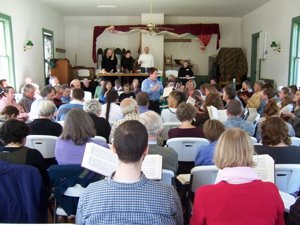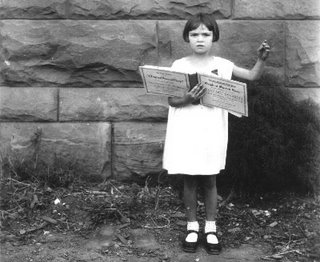Where is thy sting?
The Minnesota State Sacred Harp Convention was held this past weekend. Attendance was less than some past years, but the quality of the singing was excellent, as usual. There was a good number of first-time singers at the singing school conducted by Bruce Rye on Friday evening. I'm afraid, though, that he left many of them overwhelmed since he jumped into singing almost right away, with too little instruction. But his energy and passion was infectious. I was impressed by how he taught without a book in his hand -- he simply called out the tunes he wanted by number and sang them -- including shapes -- by heart. (And a good thing since the book he was carrying was the 1936 edition, not the 1991 revision we use.)
In addition to the reliable visitors from Chicago and St. Louis, there were several visitors from the United Kingdom -- mostly from Derby, as far as I could tell -- who we were very happy to have with us.
I had been asked a couple of weeks ago to give the memorial lesson, a time before dinner on Sunday when we remember singers who have died since the last convention or who are sick or shut-in. The custom is for a singer to say a few words, read the names, and lead a song in their memory. I put quite a lot of thought into what to say, mainly because brevity is encouraged and because I wanted to avoid being overly sentimental, which sometimes happens. It was a lot harder than I thought it would be, and ended up with two entirely different texts and not sure which one to use.
But then, on the Monday morning before the convention, the 93-year old mother-in-law of a favorite local singer died. She had welcomed us to sing in her home several times, and some local singers sang at her funeral. (I was unable to attend.) Then, we learned that the family emergency for which a singer from Portland, Oregon, had had to leave on Saturday afternoon was the impending death of her infant niece. So much of what I had prepared seemed inadequate all of a sudden, and I had to let go of my prepared remarks and let the spirit lead me.
As the morning progressed, every one of the seven songs that I had chosen to sing for the lesson had been used. (I'm not sure whether the rule against singing the same song twice in he same day applies generally to the memorial lesson, but I was advised not to use a song that had been taken.) During the break immediately before the lesson, the co-chair asked me if I had noticed how so many sad songs had been led that morning. It was as if all of us were being moved by the same thoughts.
When the time came, I spoke from the heart. Here's a rough idea of what I ended up saying (or think I remember saying) :
When Christine asked me to prepare the memorial lesson for today, a phrase came to me: There is no such thing as “Sacred Harp singing.” There is only people who sing Sacred Harp.I then read the names, a little more slowly and deliberatly than is usually done, putting just a moment or two of silence between each one. It felt very reverent and real.
But that seemed a pretty thin reed to support a memorial lesson, so I began to think about how Sacred Harp singing, especially at a convention like this, is a kind of Brigadoon experience, a reality that exists for a short time every once in a while, largely invisible to non-participants, during which we singers experience life in a different, deeper way than usual, after which we return to our mundane lives until the next time.
I was going to talk about what we experience when we sing is a reality that transcends time and space during which we are present spiritually with those who have gone before and will come after, as it is and will be in heaven.
But on last Monday morning, Death made a personal visit to our community of singers here in Minnesota and took our sister, Helen Stevens, mother-in-law of our chairwoman Christine. And yesterday, our friend from Portland had to leave early for a family emergency, which was the impending death of her infant niece.
While I believe with all my heart that Sacred Harp singing creates the experience of life eternal in the company of all who sing, have sung, or will sing this music, I realized that talking like that can sound an awful lot like cheap grace, as if we’re wishing death away too easily without counting its cost. We need to remember that our brother Death is here with us at every singing we have, ready to take any one of us.
But we don’t shrink. We give Death his seat, but refuse to cower. We recognize his existence, but we deny his sovereignty. We will each die, but that is all we will do for Death; we are not on his payroll, as Edna St. Vincent Millay put it.
And so I returned to the first inspiration I had for this lesson: There is no such thing as Sacred Harp singing. There is only people who sing Sacred Harp. It is the people who matter. We aren’t here because of the shape of the notes, the structure of the melodies and harmonies, the poetry of the texts, or even dinner on the grounds. Those things are important in their own way, but are incidental. What is essential is the actual men and women – past, present, and future – whom God calls together to sing this music.
And so we take this time to remember those men and women who are now singing from the benches in back of us, invisible to our eyes. Each of them was loved by someone in this room, and their passing has brought the grief of love as we sang earlier.
As I read the names of singers and those loved by singers who have died since we last met, please say a silent prayer of gratitude for the love they gave us and for the comfort and solace of those who loved them who grieve their passing.
We then sang 566, Hebron:
Thus far the Lord hath led me on,
Thus far His pow'r prolonged my days;
And ev'ry ev'ning shall make known
Some fresh memorials of His grace.
Much of my time has run to waste,
And I, perhaps, am near my home.
But He forgives my follies past,
And gives me strength for days to come.
I lay my body down to sleep,
Peace is the pillow for my head;
While well-appointed angels keep
Their watchful stations 'round my bed.
Town Hall, Historic Murphy's Landing
Shakopee, Minnesota
9-24-2006


